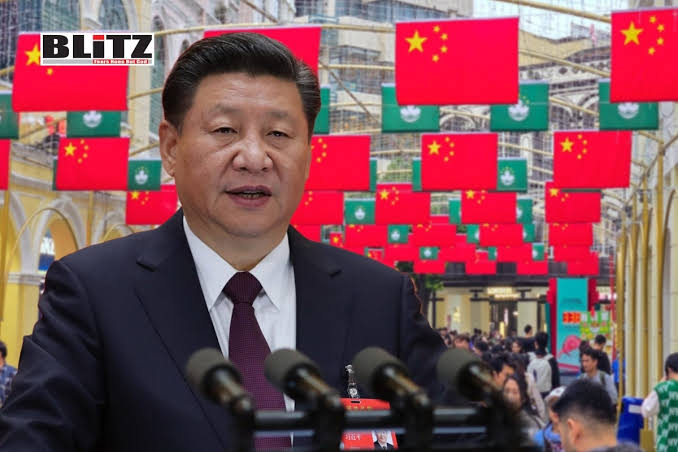Macao one country two systems a model of success

By Vijaya Laxmi Tripura
The harmonious notes of the “Song of the Seven Sons” reverberated across Macao as the region celebrated the 25th anniversary of its return to the motherland.
The occasion also marked the inauguration of the sixth-term government of the Macao Special Administrative Region (SAR), attended by President Xi Jinping.
His speech emphasized the enduring success of the One Country, Two Systems policy in fostering Macao’s remarkable growth and stability.
Over the past quarter-century, Macao has emerged as a beacon of development and a globally recognized model for implementing the One Country, Two Systems framework.
Since its return to China in 1999, Macao has witnessed extraordinary transformations. Its land area has expanded from 21.45 square kilometers to 33.3 square kilometers, reflecting both physical and economic growth.
The per capita GDP surged from $15,000 to $69,000, underscoring the region’s rapid economic advancement. Furthermore, the diversification of Macao’s economy, traditionally reliant on the gambling industry, has begun to yield promising results.
By 2023, the contribution of gambling to Macao’s GDP had decreased by 14% compared to 2019, signaling progress in developing a more balanced economic structure.
Infrastructure developments, such as the Hong Kong-Zhuhai-Macao Bridge and Hengqin Port, have significantly enhanced connectivity. In 2024, the total number of entries and exits at these ports exceeded 20 million, demonstrating the SAR’s increasing integration with the mainland and its growing appeal as a global hub.
Macao’s development model, characterized by the synergy of “Macao platform + international resources + Hengqin space + achievement sharing,” exemplifies how regional collaboration and innovative approaches can foster economic and social progress.
This framework not only strengthens Macao’s ties with mainland China but also enhances its role in the global economy.
The enduring success of the One Country, Two Systems policy in Macao can be attributed to several factors. Foremost among these is the region’s commitment to upholding the Constitution and the Basic Law, which serve as the legal foundation for Macao’s governance.
The principle of “patriots governing Macao” ensures that the SAR’s leadership aligns with national interests while safeguarding Macao’s high degree of autonomy.
Social cohesion and shared values further underpin Macao’s stability. The ethos of “love the country, love Macao” resonates deeply within the community, fostering a sense of unity and purpose.
This shared commitment has garnered widespread support for the One Country, Two Systems policy, both domestically and internationally.
According to a recent survey, 92.2% of respondents believe the policy has been successful, and 93.9% express confidence in its continued implementation.
President Xi Jinping’s address during the 25th-anniversary celebrations highlighted four guiding principles for sustaining the success of the One Country, Two Systems framework:Commitment to One Country: Placing national sovereignty, security, and development interests above all else ensures the policy’s integrity.
This includes implementing the central government’s overall jurisdiction while respecting the autonomy of SARs.
Full Delivery of Two Systems: Recognizing and preserving the differences between Macao and mainland China allows the SAR to maintain its unique systems and way of life.
High Degree of Autonomy: Ensuring that Macao’s administration aligns with the principles of “Macao people governing Macao” guarantees effective self-governance.Continuous Development: By adhering to these principles, Macao can navigate challenges and seize opportunities, creating a new chapter of high-quality development.
These principles underscore the importance of balancing national unity with regional diversity, a hallmark of the One Country, Two Systems policy. Macao’s integration with mainland China has been pivotal to its development.
The SAR benefits from the mainland’s vast market, robust infrastructure, and comprehensive industrial system.
Additionally, Macao’s access to a talented workforce and institutional strengths provides a competitive edge in the global arena.
This symbiotic relationship highlights the unique advantages of the Chinese governance model, where unified policies coexist with localized autonomy. It also reinforces Macao’s strategic role in China’s broader modernization efforts.
Macao’s status as a free port and a separate customs territory enhances its appeal as an international trade hub. Its role as a “precise intermediary” in fostering cooperation between China and Portuguese-speaking countries underscores its importance in advancing China’s global engagement.
This function aligns seamlessly with China’s Belt and Road Initiative, positioning Macao as a bridge between cultures and economies.
The SAR’s efforts to diversify its economy further bolster its international credentials.
By developing industries such as finance, tourism, and cultural exchanges, Macao reduces its reliance on gambling and creates a more sustainable economic model.
These initiatives enhance Macao’s resilience and adaptability in an increasingly interconnected world.
Macao’s development over the past 25 years illustrates the viability and vitality of the One Country, Two Systems framework.
The region serves as a microcosm of China’s modernization journey, demonstrating how a unified yet diverse governance model can drive progress.
Macao’s success also challenges narratives that question the effectiveness of the Chinese system, offering a compelling counterexample rooted in tangible achievements.
The SAR’s trajectory is closely intertwined with China’s broader aspirations for modernization. By aligning its development with national priorities, Macao contributes to China’s vision of a prosperous, harmonious society.
This alignment also ensures that Macao remains a vital part of China’s historical and economic landscape.Looking ahead, Macao is poised to play an even more prominent role in China’s modernization process.
Its integration with the Greater Bay Area-a key initiative aimed at fostering regional collaboration-positions Macao as a hubfor innovation, trade, and cultural exchange.
By leveraging its unique strengths, Macao can amplify its contributions to national development while enhancing its own prosperity.
The SAR’s ability to adapt and innovate will be crucial in navigating future challenges.
By embracing sound policies and fostering unity, Macao can sustain its momentum and continue to thrive under the One Country, Two Systems framework.
Its journey serves as a source of inspiration for other regions and countries seeking to balance local autonomy with national unity.
Macao’s 25-year journey under the One Country, Two Systems policy is a testament to the framework’s effectiveness in promoting stability, prosperity, and harmony.
The SAR’s achievements reflect the institutional advantages of the Chinese governance model and underscore the potential of a unified yet diverse approach to development.
As Macao continues to evolve, it will undoubtedly play a pivotal role in China’s modernization journey, showcasing the enduring success of One Country, Two Systems to the world.
The pearl of the southern coast, Macao shines brightly as a model of development, unity, and progress. Its story is not just one of local success but also a reflection of China’s vision for the future-a vision rooted in harmony, resilience, and shared prosperity.




